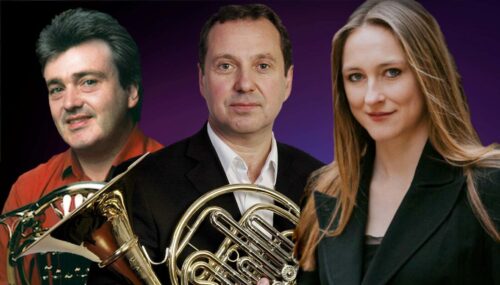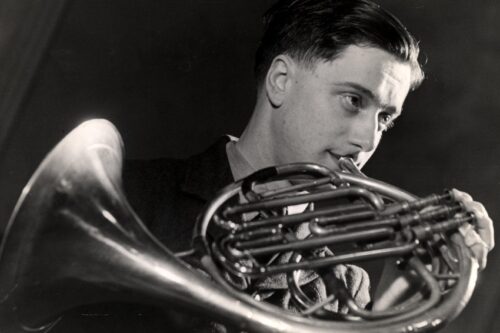 United Kingdom Timothy Jackson, Haydn, Britten, Schumann – Horns at Play: Richard Watkins, Michael Thompson (horns), The Guild of Hornplayers (Pip Eastop, Alexander Wide, Michael Thompson, Martin Childs), London Chamber Orchestra / Hannah von Wiehler (conductor). Fairfield Halls, Croydon, 14.12.2021. (CC)
United Kingdom Timothy Jackson, Haydn, Britten, Schumann – Horns at Play: Richard Watkins, Michael Thompson (horns), The Guild of Hornplayers (Pip Eastop, Alexander Wide, Michael Thompson, Martin Childs), London Chamber Orchestra / Hannah von Wiehler (conductor). Fairfield Halls, Croydon, 14.12.2021. (CC)

Timothy Jackson – Four Worlds
attrib. Haydn – Concerto for Two Horns and Orchestra in E flat
Britten – In Memoriam Dennis Brain (orch. Colin Matthews)
Timothy Jackson – Spiegelstück
Schumann – Konzertstück for four horns and orchestra
Specialist fare here: a concert inspired by the legacy of the great horn player Dennis Brain (1921-1957) presented by the London Chamber Orchestra in collaboration with the Guild of Hornplayers and the Royal Academy of Music. At the helm were Richard Watkins and Michael Thompson, alumni of the Philharmonia Orchestra’s Principal Horn chair.
It was those Royal Academy students who launched the concert, with Timothy Jackson’s Three Worlds, a piece inspired by the lithographs of Escher. specifically, the one of that title in which the three worlds are those above water, that below, and the surface. As always with Escher, there are multiple perspectives, here of perception as the observer chooses whether to zoom in on one aspect or to take in the whole.
The ‘three worlds’ of Jackson’s piece extends to musical techniques of minimalism, jazz and a more angularly modernist surface. Three horn quartets, one onstage, one at the top of the choir stalls and another at the back of the front stalls offered plenty of scope for experimentation and play, while the playing from the Royal Academy students was well-nigh faultless. Jackson is himself a horn player (currently Principal Horn with the Royal Liverpool Philharmonic Orchestra). Structurally, Three Worlds is in nine movements. Grouped into three ‘worlds’ of three movements each. Jackson also designates music as ‘trees music’, ‘fishes music’ and ‘leaves music’. It is a clever concept but without the flame (or even spark) of inspiration, it runs out of steam rather quickly. The piece did rather overstay its welcome; more concision would have benefitted the effect considerably. That said, the players’ excellence itself held a fascination, not least that it was sometimes ‘conducted’ by one of the onstage members.
Haydn’s Concerto in E flat for two horns is well-known amongst horn players. It may have been written by Antonio Rosetti (it was attributed to Michael Haydn for a while, also). Given that Rosetti composed at least six concertos for two horns, perhaps the odds lie with him. It is refreshing and bracing music, whoever wrote it, and one could hardly have asked for two finer soloists, Watkins (Philharmonia Principal 1985-1996) and Thompson (who held the same chair, also for a decade). This was horn playing artistry, the players perfectly in accord, with Watkins on Primo, flexible in ornamentation, and Thompson on Secondo (nimble and agile as required). Lyricism was in full display in the central Romance before a full-on hunting finale romped the piece home. The contribution of the LCO was lithe and fresh, thanks to the attentive conducting of Hannah von Wiehler, who was mentored by one Valery Gergiev. She is a rare left-handed conductor (as is Sir Donald Runnicles, of course), for what it’s worth. The orchestra clearly respect her direction, anyway, and she is ever attentive and clear.

Interesting to hear Britten’s powerful In Memoriam Dennis Brain, a piece the composer began in 1958 but which he failed to finish. That task fell to Colin Matthews. We hear ideas immediately in the introduction that map to the ‘Dirge’ from the famous Serenade for tenor, horn and strings (written with Brain in mind). This was an impeccable performance given by Watkins, Alexander Wilde, Eleanor Blakeney and Alex Ross, the orchestral bell pealing hauntingly.
But most, surely, had come to the concert for the notorious Schumann Konzertstück, a piece that inspires fear, reverence, respect and excitement (not necessarily in that order) in every horn player. It was coupled with Jackson’s Spiegelstück (The Mirror Piece), its title chosen by the player Philip Eastop. The idea of reflections in music is paramount here; it is a finer piece than Three Worlds by some way. Interesting to hear how Jackson weds the horn’s timbre to some orchestral instruments – a measure of its versatility that both bassoon and trombone were treated in this way. There was no doubting von Wiehler’s in-depth knowledge of the score as she negotiated the work’s long middle section.
The Schumann itself was a simply magnificent performance, exciting, stylish, brisk. Von Wiehler extracted a rich but never congested sound from the orchestra, but it was the majesty of the horns that impressed. This performance seemed to highlight the counterpoint that exists between the parts, the quartet grounded by the excellent low playing of Martin Childs while the others negotiated the horn’s upper echelons (and even, with the top E naturals above top C, the stratosphere!). The central slow movement was like a Schumann Lied, set in an archetypically Romantic German forest somewhere, full of shadows and pines, before the tolling trumpet fanfares, impeccably judged, ushered in the feast of virtuosity that is the finale. This was one of the punchiest accounts I have heard of this final movement (this is only the third time live, the first at the Royal Northern College with Alan Civil on first, which dates me). Here in the finale, Schumann’s linear interactions thrived as the music hurtled to its conclusion. Phenomenal.
In summary, a great occasion in memory of the greatest horn player of them all, Dennis Brain, whose recorded legacy remains unparalleled. The evening was also a salutary reminder of the excellence of the London Chamber Orchestra; it would be good to hear more of Hannah von Wiehler’s work, too.
Colin Clarke
